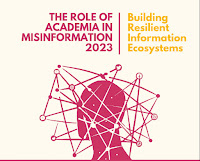I”ve recently signed an
open letter on ‘The Pseudoscience Crisis’, expressing concern about the lack of academic response to it. Our online world can generate misinformation, rather than fact, and psychiatry has also been affected in this way. By the way, I don’t see my relational psychiatry blog as pseudoscience and recognise how biased the academic literature is, which is why I blog (see eg.
post on my personal blog). Brain overclaim is very common in academic psychiatry (see eg.
previous post).
I have been worrying for some time, though, particularly about the misinformation on the internet about side effects of psychotropic medication. Some critics of psychiatry, such as Peter Breggin (see eg. my
book review), do not seem to apply the same rigorous scepticism to side effects as they do to treatment effects of psychotropic medication. Don’t get me wrong! I have emphasised before (eg. see
previous post) that psychiatry does not take seriously enough patients’ complaints about side effects. I was one of the first in the literature to point out the importance of antidepressant discontinuation problems (see my
BMJ letter). Withdrawal symptoms are now accepted for antidepressants (see eg.
previous post), as they should be for all psychotropic medication.
Biomedical websites contain misinformation about neurological effects in psychiatric conditions. For example, I’ve mentioned before (see
previous post) that the Treatment Advocacy Center website misleads people about schizophrenia causing anosognosia. The background information page linked from that 2012 post has been updated (see
pdf). This pdf makes clear that anosognosia is not the same as denial of illness. Whereas,
another webpage from the same Center says that anosognosia is also known as lack of insight. Denial of illness and lack of insight in schizophrenia are the same thing. The apparent confusion on the website is not helped by the above mentioned pdf going on to say, “Approximately 50% of individuals with schizophrenia and 40% of individuals with bipolar disorder are estimated to have co-occurring anosognosia". That may well be the case for lack of insight or denial of illness, but not anosognosia. And, as I said in another
previous post, "it's stretching a point to regard lack of insight in schizophrenia as the same as anosognosia caused by brain injury or stroke". In fact, it’s wrong! Lack of insight and denial of illness in schizophrenia are functional not structural.
Independent-minded psychiatrists, like me, do not need to be mavericks! Whereas, I have called
Dr David Healy a maverick (see my
book review). David has been very active on the internet, including his
Rxisk website. I very much agree with the motto of that website that, “No one knows a prescription drug’s side effects like the person taking it". But then the role of the doctor in such situations is to discuss with the patient what the cause might be, and to evaluate the effects by taking into account their own medical expertise. As I’ve said before in yet another
previous post,
What worries me about David's position is that he tends to take a physicalist approach to medication and not necessarily consider how people react to the taking of medication.
Let me use the example of whether antidepressants can cause akathisia as an example to explain my point. I don't think I ever saw an antidepressant cause akathisia in my professional career. Nonetheless, akathisia has been reported as an adverse event with antidepressants (eg. Madhusoodanan et al, 2010). That's also not to say that there can't be initial adverse reactions, which are not as widely recognised as they should be, when taking antidepressants, such as paradoxical initial worsening of depression and pendular euphoria (Fava & Ravanelli, 2019). But the paradoxical and pendular responses may not be so much due to a direct effect of the medication but to how the person has reacted to the taking of the antidepressant.
Similarly, there can be individual reactions that can be misinterpreted as akathisia. Akathisia is a extrapyramidal movement disorder caused by traditional neuroleptic/antipsychotic medication, such as chlorpromazine and haloperidol. Other extrapyramidal disorders caused by these kind of drugs are acute dystonia, parkinsonism and tardive dyskinesia. Atypical antipsychotic medication is associated with less diagnosis of akathisia than the first generation of antipsychotic medication.
Even with antipsychotic medication, there can be misdiagnoses of akathisia that are, for example, really due to psychotic agitation itself. Akathisia is characterised by a subjective feeling of inner restlessness and an inability to sit still. Signs are repetitive movements, such as leg crossing, swinging or persistent shifting from one foot to another (eg. Salem et al, 2017). There are diagnoses of akathisia related to antidepressant use in case reports in the literature, which I think are at least suspect misdiagnoses. For example, Akagi & Kumar (2002) report three cases of akathisia because of symptoms such as behavioural disturbance, agitation, anxiety, restlessness, inability to sleep, pacing the house, sense of dread triggered by minor events, acute suicidal ideation and fear of being left alone because of suicidal urges. These functional symptoms don't necessarily sound like the neurological condition of akathisia to me in these reports, however unpleasant the experience of akathisia can be. Yet the paper is commonly referred to when people say that antidepressants can cause akathisia.
Similarly, the Rxisk website states that akathisia is an emotional state that causes suicidality, homicidality and other disturbances of behaviour. Hang on, where's that come from?! To be honest, I'm not exactly sure, but let me try and trace some of its origins.
As I've said earlier, Peter Breggin, who wrote Toxic Psychiatry, has expressed concern about the apparent side effects of antidepressants. He included manic switch, akathisia, suicide and violence in this list as facts, whereas at least the mechanism of these said associations are controversial and I remain sceptical about them as direct effects of the medication. For example, I think the published data does suggest a small increase in suicidality with antidepressants, but probably not for completed suicide (see previous post). I'm still not convinced that the analyses have necessarily eliminated all bias (see eg. Kaminski & Bschor, 2020), but even so I don't think we should be surprised by any association (not necessarily cause anyway, as such, in terms of direct effect of the medication). Doctors do need to be cautious about prescribing antidepressants because of self-harm and suicide risk. That's already been in advice and guidelines to doctors for some time.
The data suggests any increased risk is at least mainly in the first two weeks of treatment. To continue with the theme of this post, how people react to taking antidepressants does matter. For example, the person may feel that the doctor is trivialising or not understanding their problems by 'palming them off' with an antidepressant prescription. For instance, I think many practitioners will have had the experience of assessing someone for depression, not thinking they are at risk of suicide, maybe even discharging them and encouraging continuing antidepressant or other treatment, only to be surprised, even shocked, to hear later that they have killed themselves. Ok, they were probably at high risk of suicide, which was not detected or they covered up, but the point is that how the patient reacts to what the doctor has told them and done could be seen as a factor in the cause of suicide. To repeat, doctors do need to be cautious when starting antidepressants.
Peter Breggin has emphasised brain-disabling treatments in psychiatry, including in the title of another of his books. Tardive dyskinesia (TD), which as I mentioned above, is one of the four extrapyramidal symptoms of neuroleptic medication like akathisia, and such neuroleptic prescription can be seen as brain disabling treatment. If a neuroleptic drug causes TD then the symptoms may be permanent and even exacerbated, at least for a short-time, by discontinuing the medication. In other words, there does seem to be evidence that traditional neuroleptics can cause brain damage. As Peter has argued (see article):
If neuroleptics were used to treat anyone other than mental patients, they would have been banned a long time ago. If their use wasn't supported by powerful interest groups, such as the pharmaceutical industry and organized psychiatry, they would be rarely used at all.
Atypical antipsychotics have now largely replaced neuroleptics on the market and, as I indicated above, these newer drugs are at least less likely to cause extrapyramidal symptoms, such as akathisia and TD.
What I think happened is that Peter Breggin switched his concern about brain disabling treatment of psychotropic medication from antipsychotics to antidepressants and David Healy copied him. Their scope for dissemination of their ideas on the internet has helped. Antidepressed: A breakthrough examination of epidemic antidepressant harm and dependence, a successful literary publication to inform consumers and prescribers about antidepressants from the point of view of patient experience quotes extensively from Peter and David, maybe especially David. The internet has been a forum for service users/survivors, who have not felt understood by psychiatry. They can communicate with each other much more easily on social media. But as I have said, David’s a maverick, and people should be more cautious about quoting him.
To go back to akathisia, the Akathisia Alliance for Education and Research is a nonprofit organization formed by people who have experienced it. I'm not sure how much David is one of their advisors. They highlight a paper by Salem et al (2017), which does not quote David at all. I think this is a helpful paper. As I have been emphasising, this paper is clear that akathisia is particularly associated with antipsychotic medication, not necessarily antidepressants. Again, the Alliance highlight a Youtube video of Joseph Glenmullen talking about the 'torture of akathisia'. It can be very difficult to cope with the inner restlessness of akathisia. As the video says, this is different from the experience of depression.
The Rxisk website says without reference that “Healthy volunteers commit suicide after a few days exposure to them [ie. drugs like clozapine, an antipsychotic]” (see webpage). This must sound terrifying to patients. However, I’ve no idea why (even whether) this happens to normal volunteers, when it doesn’t happen to patients on clozapine, at least the ones I saw, OK rarely started by me, if at all!
Scaring patients isn’t the way to get a balanced view of the benefits and risks of taking psychotropic medication. As I’ve always said, I’m sceptical about the value of psychotropic medication. I doubt whether antidepressants are effective but I can’t prove it (see eg. previous post). And as for their physical side effects, there can be misdiagnoses, particularly on the internet, which patients and other people increasingly use.








